With their latest thriller The Day Of The Jackal now Sky’s biggest ever original commission, Carnival Films execs Nigel Marchant and Gareth Neame talk about putting British drama on the map with Downton Abbey and their plans for more ‘big, commercial productions’
“It’s depressing that you enjoy all of this for about a week.” Carnival Films managing director Nigel Marchant is reflecting on how fleeting moments of success can often feel in our industry.
Carnival is in the middle of a flurry of media activity around Sky and Peacock co-commission The Day Of The Jackal, a tentpole series for which Eddie Redmayne was convinced to return to TV after years of turning out Oscar-winning performances on the big screen. With 3 million viewers in its first week, the series is Sky’s most-watched original drama ever and has been commissioned for a second series, but Carnival isn’t resting on its laurels.
“I was saying to our head of HR: that week of glory has gone and now it’s, ‘Right, let’s look at what we’ve got coming down the road’,” Marchant says.
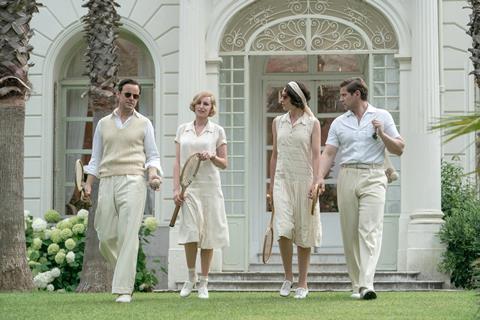
He doesn’t have to look far: 2024 has been one of the busiest years ever for the NBC Universal-owned company, delivering Jackal, Sky and Peacock sibling Lockerbie: A Search For Truth, the latest Downton Abbey film and Peacock original All Her Fault.
But both Marchant and Carnival chief executive Gareth Neame are acutely aware of the current febrile state of the drama world.
“We have more that doesn’t get made than does,” Neame notes. “Attrition is still high, and you keep throwing things at the wall to see what sticks.”
This smorgasbord approach has led Carnival to create a wide-ranging library of drama since Neame joined as managing director in 2004 (Marchant took over that role in 2017): BBC2’s The Hollow Crown, ITV’s Whitechapel, Any Human Heart for Channel 4, Netflix’s The Last Kingdom, ITV/Epix’s Belgravia and ITV and PBS’s Downton Abbey.
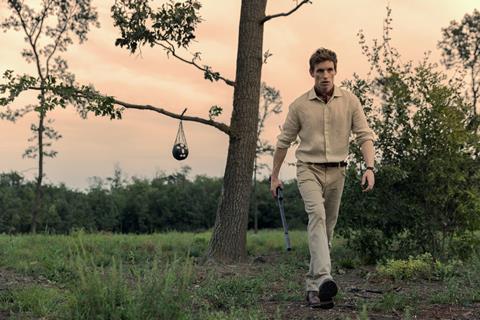
Jackal is arguably Carnival’s biggest show since Downton became a global phenomenon in 2010. The cat-and-mouse series about the hunt for an elusive assassin is adapted from Frederick Forsyth’s bestselling novel, previously the basis of Frank Zinnemann’s seminal 1973 film starring Edward Fox.
Clearly, it has had handsome financial backing from Sky and Peacock, with its exotic locations, high production values and on- and off -screen talent. But Neame also credits Carnival’s experience of filming in continental Europe, knowledge of tax breaks and general hustle – a hallmark, he says, of British drama producers.
“When we sold the show in 2022, the number on it was way smaller than many of the big shows on streamers,” Neame says, without going into the actual figures. “So it is a big budget, but it’s been quite cleverly done with all the efficiencies we’ve used.”
Contemporary thriller
Marchant and Neame both acknowledge they were nervous about taking on such historic IP – the pair were so hell-bent on not destroying the original film that they “sat on it for quite a while”, Neame says.
The few criticisms that have come its way have centred on the differences between Fox’s cold, near-silent performance and Redmayne’s loquaciousness.
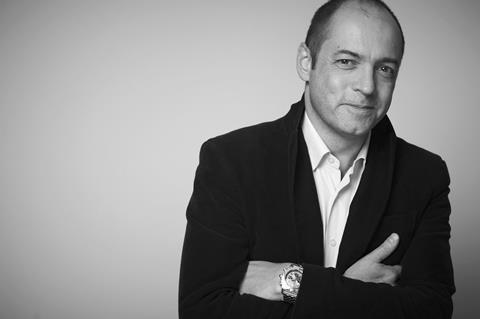
Neame says the attachment of Top Boy creator and Gunpowder writer Ronan Bennett helped sell the project, which uses Forsyth’s novel as a starting point for a contemporary thriller touching on geopolitics (though not specifically about the assassination of a head of state), big tech and big business, while interweaving more domestic concerns into the Jackal’s backstory.
Jackal is set up as a ‘four-quadrant’ tentpole by every TV industry measurement of a scripted series. It strives to balance prestige art with accessible drama, and mixes epic action tropes with universal themes of love, loyalty and friendship.
“We’ve never been scared by entertainment,” Marchant says. “You make shows as if you’re a fan of them – ones you want to watch.”
Neame adds: “Entertainment has never been a dirty word to me. I have always wanted to make big commercial productions.”
He cites the four years he spent as head of drama at the BBC in the early 2000s, where he drove a strategy to have series with “much more commercial ambition”, like Hustle, State Of Play and Spooks.
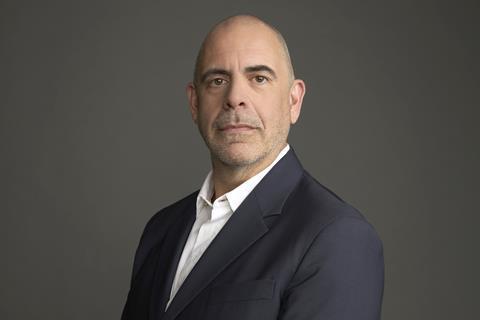
Despite appearances, Neame says, Carnival’s splashy globetrotting series is not a departure from his prior work or the label’s other, equally glossy, offering: Downton Abbey.
Julian Fellowes’ six-series post-Edwardian creation is, he reckons, “probably Britain’s biggest scripted export”, though he caveats that by admitting he doesn’t know the exact stats.
During Downton’s broadcasting period of 2010-2015, Pact regularly name-checked the show for driving British export revenues to more than £1bn.
“The difference is Downton launched in a pre-global age – it was impossible to watch any British TV in the US unless it was on PBS,” Neame notes. “That globalisation is what’s allowed British TV to get traction. What’s not widely known about Downton is that it started a new chapter in the value of UK content, because it was sold by a Hollywood studio.”
At Downton’s launch at Mipcom, Neame recalls, NBCU Global TV Distribution refused to accept lowball licensing figures from buyers who had historically apportioned a capped value to British shows.
“It was the first time a British show got a network television value, and [proved] it was possible to have a global hit of great value from out of the UK.”
“We will never not be proud of Downton, but it’s nice to remind people that’s not all we can do”
Nigel Marchant
Despite the litany of series that have followed, including Fellowes’ Belgravia, the pair accept that Downtown remains the title people most associate with the indie. Marchant says Carnival will “never not be proud of that show, but it’s nice to remind people that’s not all we can do”. Jackal helps to prove the label can handle a “big, contemporary, propulsive thriller, with high-octane stunts”, he adds.
With the third Downton movie due out next year, Carnival is clearly not ready to relinquish the opulent period drama mantle to franchises like Bridgerton.
Neame is protective of its legacy. “I respect all creators and how they want to express themselves, but I think it’s inconceivable that there would have been a Bridgerton without Downton having laid that ground. I don’t think there would have been The Crown without Downton.
“Downton convinced a lot of people in the US that you can create British shows of a certain global aspiration. It led that path, and the two other shows have been massively successful in their own way.”
“We’re expressly British, telling mostly British stories, but we are not looking to just have domestic hits”
Gareth Neame
Carnival’s outlook is, accordingly, on “breaking new ground” with its dramas and it is intent on being viewed as a “global British producer”. The label had operated as an indie since it was founded by Poirot producer Brian Eastman in 1978, until Neame orchestrated the sale to NBCU in 2008. It is now a pillar of Pearlena Igbokwe’s NBCU studio division Universal Studio Group (USG), sitting in the Universal International Studios sub-division.
“We’re not the ‘local for local’ label,” says Neame. “We want to find titles that sell into multiple territories. We’re expressly British, telling mostly British stories, but we are not looking to just have domestic hits. That is why we came to NBC Universal – to be part of a huge media company.”
Global ambitions
Neame is not dismissive of local UK shows: he draws parallels between Carnival’s 2014 single The Lost Honour Of Christopher Jefferies, a real-life story about the media harassment of a man named as a suspect in a murder investigation, and ITV1 sibling and runaway 2024 hit Mr Bates vs The Post Office.
“Sometimes a drama can come along that puts a whole new perspective on something,” Neame says. “My own feeling about Mr Bates’ success is that it has all the hallmarks of an Ealing Comedy: a group of British people fighting the system.”
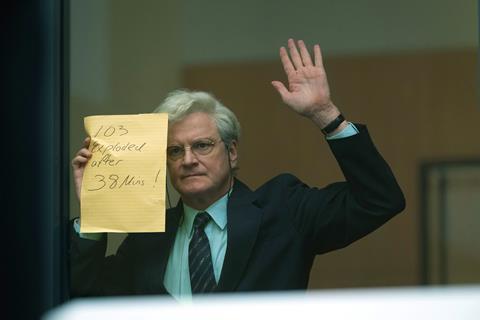
Lockerbie: A Search for Truth could be viewed as a similarly campaigning domestic drama, telling the true story of Dr Jim Swire’s fight for justice following his daughter’s death in the bombing of Pan Am Flight 103 over the eponymous Scottish town in 1988. But the journey made by Swire (portrayed by Colin Firth) to the UN, and the geopolitics, give the story wider resonance.
“It’s that classic story of the mouse that roared – one man put in terrible circumstances who stands up to bureaucracy,” Marchant says. “So there’s something in there that feels incredibly British. But it becomes more and more global.”
The series, which launches on Sky on 2 January, is based on Swire’s book The Lockerbie Bombing: A Father’s Search For Justice, which had been optioned by USG stablemate UCP (Suits). With Carnival and Sky Studios co-producing and NBCU distributing Sky and Peacock’s first scripted co-commission, the series is the first entirely vertically integrated Comcast project.
Meanwhile, Carnival’s upcoming Sarah Snook-fronted Peacock thriller All Her Fault is an exemplar, Marchant says, of the label’s ability to “break” the tag of a UK firm only being able to handle British stories. “It’s a domestic thriller, but it’s set in Chicago with a US cast. It will be a US-facing show with US production values.”
All Her Fault, Lockerbie and Jackal are all based on book IP. Besides noting that Carnival has “always been quite a literary company”, Marchant says the fact that the company is looking at IP is a reflection of the “cautious market”.
Carnival is also working up an adaptation of Ken Follett’s 20th century epic Fall Of Giants for Peacock. “If it’s got some following already, that’s only going to help. But everything is cyclical, it can change,” says Marchant. “You might think, ‘Is this the right time to go out with an original, expensive show? Do we sit on it to see where the market goes?’ You’ve got to be strategic when you’re going to market with certain shows.”
As well as taking a recent option on David Goodman’s novel A Reluctant Spy, Carnival won a highly competitive battle for Paul Murray’s Booker Prize 2023-shortlisted The Bee Sting earlier this year. Carnival is in the early stages of development with the title, which follows the lives of a dysfunctional and hapless rural Irish family, immediately after the 2008 financial crash.
It’s a busy slate, with some eye-catching titles in development, yet Neame is still hesitant of suggesting the next greenlight is coming soon.
“In this international division, we’ve traditionally been the breadwinner of the companies NBCU has acquired,” he says. “But even as the producers of Downton Abbey, we can say, ‘This is a no-brainer’, and not necessarily make a sale.
“You never know. The thing you think is going to greenlight is the one that doesn’t. Fall Of Giants hasn’t moved forward yet, but we have all the scripts, and the show is ready to go. We hope it will.”

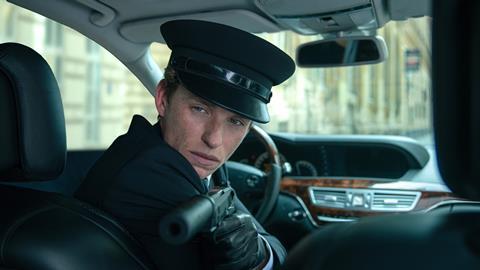






No comments yet